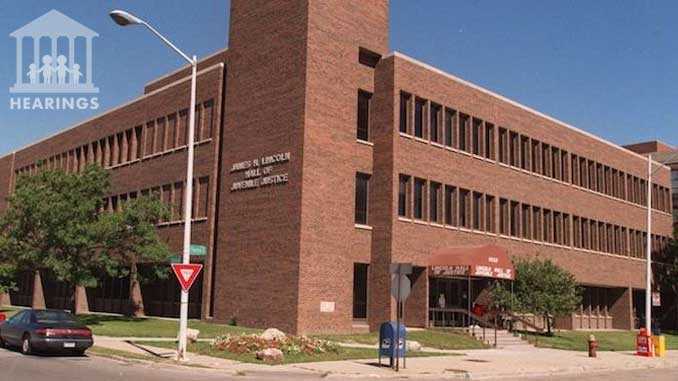
The Lincoln Hall of Justice in Detroit, the central court building for child welfare and juvenile justice cases in Wayne County, Michigan.
There was an uncommon lag in the action in Courtroom 3B of the Lincoln Hall of Justice, the building where most of Wayne County’s child welfare and juvenile justice decisions are made. A trial had been moved to another docket, and a juvenile in court on a truancy violation had failed to show (“par for the course,” one social worker observed).
During that lull in the action, two prosecutors were chatting nearby about an upcoming case and discussing whether the “ICWA paperwork” had been completed in it.
They were talking about the Indian Child Welfare Act, a law passed in 1978, which afforded Native American families more legal protections against the removal of their children than any other people living in the United States, at least on paper. The rationale for ICWA was simple. At the time the law was passed, about one third of all Indian children were removed from their parents and placed with white families.
ICWA sets a higher bar for family preservation in cases where a child is a member of a tribe, or is eligible for membership and has a parent who belongs. States must make “active efforts” to keep these families together and, when foster care is necessary, to reunify them. ICWA also requires that relatives, or other Native Americans, be the first option for out-of-home or pre-adoptive placements.
I asked one of the attorneys later if ICWA came up a lot in the cases she dealt with. Federal data suggests that just a few hundred of the state’s foster youth – 11,918 in 2017 – were identified as Native American. Only 57 foster families in the state identified as being Native American households.
She looked flummoxed that I was interested. I explained, to her surprise, that the law had recently been ruled unconstitutional in a federal district court, and that its fate would likely be decided soon in the appeals process. Oral arguments in the case, Brackeen v Bernhardt, were heard in March by the Fifth Circuit Court of Appeals.
“There are a lot of claims” of Indian heritage made in dependency hearings, she said. But she could count on one hand at any time the number of her cases where actual tribal membership was an issue.
So why all the claims of possible heritage? She said that it is pro forma here for family court judges and referees to ask parents a series of questions about tribal membership. Michigan is one of six states that have enacted their own version of the federal ICWA provisions, according to the National Conference of State Legislatures – the others are Iowa, Minnesota, Nebraska, Oklahoma and Washington.
Since the questions suggest that ICWA could lead to special considerations, the attorney said, parents will often assert that “they heard about a great-great-grandmother who was Native American.”
Special considerations are warranted when ICWA applies – the state must meet a higher threshold of efforts to avoid using foster care, and be more diligent about placing children with relatives. But without proof of enrollment in a tribe, the cases fall outside the purview of ICWA.
Even if a child is an enrolled tribal member, each tribe varies in how it handles child dependency cases. The attorney told me that she has seen some tribes be fairly passive about taking a role in a case. Others are all over it.
“I had one case where the tribe’s attorney drove in from 300 miles away for every hearing,” she recalled.
In California, legislation was recently introduced that would enable tribes to participate in ICWA-related hearings remotely, either by phone or electronically.
This story is a part of a new Chronicle series called “Hearings,” where our reporters and guest contributors provide an inside look at how child welfare courts function.
In about half the states in the country, child welfare proceedings are closed to the public and media – despite the fact that they are places where children enter foster care; where families are ripped apart, sometimes put back together and otherwise – through adoption – made anew.
If you are a judge, parent, foster youth, attorney or an advocate for families … we want to hear from you. Share a story from a recent dependency court experience that you believe speaks to a problem or a success story.
Anonymity may be granted depending on the nature of your contribution. Our intent with this – and all Chronicle projects – is to ethically cover the child welfare system, which often means protecting the names and identities of children and families caught up in it.
To contribute to “Hearings,” complete this form (or e-mail [email protected]). Please be sure to include your name, location and role in a child welfare case.






